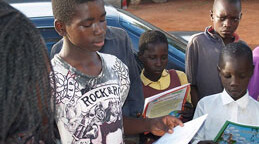Invisible Children's Kony 2012 campaign has reached critical mass and turned Joseph Kony into a household name. But does the organization's simplified message misinform the public and whitewash the evils of the Ugandan government? Will it all be worth it if Kony is arrested?
The runaway and controversial success of Invisible Children's Kony 2012 documentary demonstrates the challenge of global messaging. Other global campaigns like Save Darfur, Product RED, or even popular movements like Occupy Wall Street face similar challenges. In each case, activists have been accused of oversimplifying complex issues to gain mass appeal.
The uproar has been particularly loud in the case of Invisible Children. Thanks to its 30-minute documentary, Joseph Kony has become a household name. The head of a Ugandan guerilla group, Kony is said to have ordered the abduction of thousands of children to become sex slaves and soldiers. According to the International Criminal Court, he may even be guilty of war crimes.
Yet in raising awareness of Kony's crimes, critics complain that Invisible Children has introduced a misleading good guy-bad guy narrative that risks whitewashing the evils of other players in this story, like the Ugandan government. They also warn that the organization's appeal for donations transforms activism into a mere financial transaction. Ultimately, winning the hearts and dollars of Western sympathizers won't cure Uganda's ills.
For the documentary's supporters, it is the very simplicity of Invisible Children's message that accounts for its appeal. Making the issue more complex would only risk diluting the larger point: that Kony is evil and needs to be stopped. Moreover, portraying the issue as overly complicated could make the problem seem unsolvable. This, advocates warn, is a recipe for inaction.
As Invisible Children continues its campaign, do you think global success has come at the cost of oversimplification? Is this a price worth paying if it leads to Kony's arrest?
For more information see
Ethan Zuckerman, "Unpacking Kony 2012," My heart's in Accra, March 8, 2012
Noam Cohen, "A Video Campaign and the Power of Simplicity," The New York Times, March 11, 2012
Photo Credits in order of Appearance:
Jane
Rahman [also for picture 11]
Robert
Raines
Bachrach44
Ally
Mauro
Paul Stein
sean
dreilinger
Pierre
Holtz, UNICEF CAR
:)gab(:
Tech.
Sgt. Jeremy T. Lock/U.S. Air Force
VOA
- I. Broadhead
Adele
Booysen
Uncommon
Fritillary
